- Home
- Tim Powers
Epitaph in Rust
Epitaph in Rust Read online
AN EPITAPH IN RUST
Tim Powers
www.sfgateway.com
Enter the SF Gateway …
In the last years of the twentieth century (as Wells might have put it), Gollancz, Britain’s oldest and most distinguished science fiction imprint, created the SF and Fantasy Masterworks series. Dedicated to re-publishing the English language’s finest works of SF and Fantasy, most of which were languishing out of print at the time, they were – and remain – landmark lists, consummately fulfilling the original mission statement:
‘SF MASTERWORKS is a library of the greatest SF ever written, chosen with the help of today’s leading SF writers and editors. These books show that genuinely innovative SF is as exciting today as when it was first written.’
Now, as we move inexorably into the twenty-first century, we are delighted to be widening our remit even more. The realities of commercial publishing are such that vast troves of classic SF & Fantasy are almost certainly destined never again to see print. Until very recently, this meant that anyone interested in reading any of these books would have been confined to scouring second-hand bookshops. The advent of digital publishing has changed that paradigm for ever.
The technology now exists to enable us to make available, for the first time, the entire backlists of an incredibly wide range of classic and modern SF and fantasy authors. Our plan is, at its simplest, to use this technology to build on the success of the SF and Fantasy Masterworks series and to go even further.
Welcome to the new home of Science Fiction & Fantasy. Welcome to the most comprehensive electronic library of classic SFF titles ever assembled.
Welcome to the SF Gateway.
Contents
Title Page
Gateway Introduction
Contents
Preface
Book One. Rufus Pennick
Chapter 1. Brother Thomas
Chapter 2. A Day in the City
Chapter 3. The Misunderstanding in Pershing Square
Chapter 4. A Night at the Blind Moon
Chapter 5. The Girl at the Far End of the Row
Chapter 6. The Dark-Rum Queen
Book Two. Nathan Gladhand
Chapter 7. A Bad Dinner at the Gallomo
Chapter 8. The Head in the Box
Chapter 9. Deductions in Room Four
Chapter 10. “With This Memory Bank …”
Chapter 11. The Last Night of the World
Website
Also by Tim Powers
Dedication
Author Bio
Copyright
Often there’s a whisper that I hear in shadowed streets.
A breath of desperation from the tall, far-seeing clouds
Or gasp of outrage from a manhole cover—something meets
Between the earth and sky, in pain, and if the shifting crowds
Can sense it, their response is only in their frightened eyes.
The very breezes pick their way among the alleyways
As if afraid of something in the gray December skies,
Or listening to the heartbeat of these hollow latter days.
Ride on, Messiah—there’s no place for you behind the wheel.
You’ve come too late to sell your closing chapters, for our hands
Have written us an epitaph in rust, on dusty steel.
We’re pulled aside and served with debts and overdue demands
By angry, ragged shapes that once were us; and when we pay
We’ll wait in neatly ordered lines to sign our souls away.
—from the unpublished
Poems of Rufus Pennick
BOOK ONE
Rufus Pennick
CHAPTER 1
Brother Thomas
When the carillon of bells rang out across the valley to herald matin prayers, Brother Thomas struck the rusty lock off the door of the monastery’s highest tower, and swung it open. He stepped cautiously out onto the flat stone blocks of the tower’s roof and groped his way through almost total darkness until he touched the crumbling parapet; a cold night wind swept up the valley from the south, and he shivered as he opened his robe to lay down his two bundles.
Up from below him floated the solemn voices of the Brothers of St. Merignac at their midnight prayers. I hope they’re all too sleepy to notice my absence, Brother Thomas thought. God knows I’ve never been very alert at matins.
He knelt down and untied his bundles. The first held two flexible sticks that fitted together to form a long, tapering rod with a heavy cork butt. A series of metal rings, descending in size toward the tip, ran along the top side of it. He pulled a fishing reel out of his pocket, clamped it onto the rod’s grip and carefully drew the line through the rings. Finally he tied a gleaming steel hook onto the end of the line and leaned the rod against the parapet.
The other package was simply two wooden sticks wrapped in a diamond-shaped sheet of string-reinforced black paper. Brother Thomas tied the sticks together in a cross, flexed them, and then stretched the paper over them like a skin, fitting the string perimeter into notches cut in the ends of the sticks.
Not bad, he thought, as he gently punched the fish-hook through the front of the kite, looped it around the crossed sticks and drew the barbed point out again. With any luck, my days at this monastery are numbered.
He stood up and peered down over one of the cracked stone merlons; the high chapel windows threw streaks of colored light across the grass of the garden, and the vineyards beyond rustled in the darkness. The very picture of routine calmness, reflected Brother Thomas with satisfaction.
From another pocket he took a cheap rhinestone necklace, which he knotted around the hook. Then he lifted the kite, let the wind take it, and slowly played out the fishing line as the kite rose bucking and swinging into the night sky. After he had let out about fifty yards of line he sat under the parapet to avoid the worst of the wind, and simply waited.
Come on, he thought. Bring me a rich one. One with a discerning eye—not too discerning to like rhinestones, though.
The wind seemed to Brother Thomas to carry a hint of the smells of the city; a faint, aromatic smoke blended from the chimneys of a hundred restaurants, forges, bath-houses and incinerators. It was infinitely more alluring than the damp-earth, pine-sap and incense odors of the monastery.
A faint sound of flapping and chittering was audible above the sighing of the breeze, and he gripped the rod more tightly. His chest felt hollow and his fingers trembled a little. I hope they’re not too noisy, he thought.
Then the rod lunged in his hands and the reel whirred as yards and yards of line were pulled rapidly up into the sky. His lightly-pressing thumb felt the spooled line diminishing by the second. He’d better get tired quick, he thought, or I’ve lost two dollars worth of thirty-pound test.
The line hissed out for an eternal half-minute, and then paused. Immediately he clicked on the drag. The thing seemed to be circling now, high above, as Brother Thomas stumbled about on the dark tower-top, trying to reel in as steadily as he could. The thing in the sky resisted, but with ever weaker and more spasmodic efforts.
“Damn me! Damn me!” came a shrill cry from above. “What gives? What gives?” Thomas started so violently that he nearly let go of the rod. God in heaven, he thought; they can talk. I wish this one wouldn’t.
“Leggo, Jack. Lemme go. It wasn’t me, Jack.” The flapping, protesting creature was now only a few feet over Thomas’ head, and the young monk jerked the rod downward to fling the vociferous flier to the stone floor.
“Hoooo!” the thing wailed despairingly. “Wooo-hooooo!”
“Shut up, goddammit!” hissed Thomas. “I’m not going to hurt you!” Thomas grabbed the little bird-man by the spindly legs and awkwardly re
moved the hook from the thing’s webbed hand. Still holding on, Thomas reached into the warm pocket of the bird-man’s kangaroo-like pouch and pulled out a handful of bright, hard objects. “There!” Thomas told it. “That wasn’t so bad, eh? Now take off!”
He tossed it into the air and it spread its wings and thrashed away into the night, calling back childish insults and obscenities.
Thomas wiped his sweating forehead with his sleeve and listened intently. No apparent commotion, he thought—but all this racket must have been heard by someone. He quickly scooped up the loot he’d taken from the flier’s pouch and dropped it all into the pocket of his robe. Don’t panic, he told himself. Sneak back to your cell, crawl into bed and deny everything.
Nodding at the wisdom of his own advice, he hurried down the narrow, curling tower stairway, his fishing rod and kite in one hand and the fingertips of the other brushing the damp stone wall to keep him away from the unrailed inner edge. He was panting nervously, and the echoes in the tower made it sound as if a pack of exhausted dogs had taken refuge there. God, he thought—I’m making enough noise for ten men. I’d better hurry.
He tried to take the steps two at a time; immediately his sandaled feet slipped on the uneven mossy blocks and he rolled painfully down the last twelve steps, skinning his knees and smashing his kite and fishing pole to splinters.
“God damn it!” he muttered when, at the bottom of the stairs, he got his breath back. It had taken him six months of furtive work to make that fishing rod. He was about to get to his feet and continue his flight when the silence was abruptly broken.
“This blasphemy, Brother Thomas,” came a harsh voice, “while deplorable in itself, fades to insignificance before your more serious crime.” The owner of the voice slid open the door of a dark lantern he carried, and Thomas found himself looking up into the half-angry, half-sad face of Brother Olaus, the abbot, who stood in the open doorway.
Thomas paled. “Brother, please,” he said quickly and desperately, “don’t hand me over to the police. Give me penances, I’ll scrub the sacristy floors for a year, but don’t—you can’t—let them cut my hands off. Look, the fishing rod broke, I can’t do it anymore. If you—”
“I’m sorry, Thomas,” the abbot said. “There’s nothing you or I can do about it now. Our duties are clear. This … this calamity may, I hope, turn out in the end to have been your key to salvation.” The abbot looked down at the shivering monk with something like sympathy. “Try to see it in that light. Try—”
Thomas hit him, hard, in the stomach, and the old abbot dropped to the dewy grass like a broken piece of lumber. Thomas opened his hand and let fall a fist-sized piece of the fishing pole.
“Hey!” came a voice across the dark lawn. Running footsteps could be heard from the direction of the chapel, so Thomas turned and hobbled in the opposite direction, toward the vegetable garden and the south wall.
“Stop!” called one of his pursuers. “Stop in the name of God!’
Thomas instinctively slid to a halt. A moment later he was running again, cursing himself impatiently.
He was in among the vegetables now, in total darkness, tripping over tomato vines and putting his feet through watermelons. Chilly mud splashed his legs and clogged his sandals.
A half dozen outraged monks followed him cautiously; they assumed he was a bandit, probably armed, and possibly accompanied by vicious henchmen, so they hung back and contented themselves with shouting admonitory bits of Scripture at him.
Thomas lurched through the last of a row of bean-trellises and collided with the rough bricks of the wall. He tried to climb it, but gave up when the bricks cracked apart under his fingers. The monks, beginning to doubt his stature as a menace, were throwing rocks at him now with rapidly improving accuracy.
Thomas yelled as a well-flung cobble caught him in the ribs. I can’t linger here, he realized. He got down on his hands and knees and scuttled along the base of the wall, searching for one of the drainage pipes that passed through it at irregular intervals. He cut his finger deeply on a stray bit of broken pottery and blundered through several complicated spider webs, but found one of the pipes and, urged to haste by the thrown rocks that were tearing into the vegetation all around him, scrambled head first into the narrow, slippery, downward-slanting shaft.
The monks soon found his escape-route and were fiercely thrusting a couple of tree branches into the pipe mouth when Brother Olaus limped up and told them to be quiet. “He’s gone … you idiots,” he gasped. “Back to your cells, now, move. I’ll … inform the police in the morning.”
Still nor certain what had happened, the monks shrugged, laid down the branches and trudged back to the main building. Soon the last of the monastery’s lights was put out and the silence was, except for occasional faint sounds like voices and laughter in the sky, complete.
The air was sharp with pre-dawn chilliness, and Thomas’ nose and throat ached every time he took a breath. His first impulse was to thrash his way through the grapevines to the front gate of the monastery and pound on it until someone let him back in; they would turn him over to the police in the morning, but at least he’d be able to sleep warm until then in the piled straw on the floor of the detention cell.
No, no, he told himself, trying to muster some confidence—this is adventure. The whole world is laid out and waiting for you if you can just get clear of these damned trees and wait till the sun comes up. After a few moments of indecision he took his own word for it and plodded away through the darkness, whimpering softly as the cold penetrated every seam in his robe.
He tried to move steadily south, toward Los Angeles, but thickets and creeks and ravines twisted his course so frequently that after a while he had no idea which direction he was facing. I may wind up in the Hollywood Reservoir, he thought, or even back at the monastery. I’ve got to get my bearings.
He had been colliding frequently with pine branches and trunks, and now decided to climb one of the trees and look for the lights of Los Angeles to guide him. He peered up at the branches silhouetted against the dim purple sky, trying to judge which tree was bare enough to serve well as a ladder and crow’s nest, and chose a tall one whose limbs seemed to be solid and evenly spaced.
He went up it quickly, glad to be free of the dew-soaked, clinging underbrush, and was soon straddling a comfortable branch fifty feet above the ground. He peered around intently, trying to get his tired eyes to focus on the dim, blurry landscape. He could see no lights, but half a mile away a gray streak curved through the forest. The Hollywood Freeway, he thought, with the first surge of real confidence he’d felt that night; I’ll follow it south and be in the city by sunrise.
He hopped and swung his way back down the tree, thinking cheerfully of the breakfast he would buy with the money he’d taken from the bird-man. Bacon for sure, he thought. Scrambled eggs—no, an omelette, by God. And beer. And—
“Take it slow now, son, and keep your hands where we can see ‘em,” came an odd, quacking voice below Thomas, startling him so that he missed the next branch and half-leaped, half-fell to the bed of matted pine needles ten feet below him.
He scrambled painfully to his feet, and then froze when he saw he was surrounded by short, stocky figures. Children? he wondered dizzily.
A match flared alight in the gnarled hand of one of them, and Thomas saw that they were dwarves—a bearded, ragged crew, with mean-looking knives thrust into the belts of their leather tunics.
“A monk!” observed the one with the match. “Up in a tree, chatting with God in the middle of the night!” The other dwarves laughed uproariously in falsetto voices and slapped their knees. “Well now,” the leader went on, “what we want to know—right, boys?—is whether you’ve got some tobacco. Quick, now, no lies!”
Thomas blinked and gulped. “Tobacco?” he answered automatically. “No. I don’t smoke. Sorry.”
The dwarves growled and muttered, and a few unsheathed their knives. Thomas looked around for an escape rout
e, and saw none. “Look,” he said desperately, “I’ll get some and bring it back. There’s some at the monastery—good stuff, Cavendish. I’ll be back before the sun clears the hills.”
The dwarves frowned, scratched their beards and exchanged shrewd glances. “Ah,” piped up the leader again, poking Thomas in the ribs, “but how do we know you’ll come back? Eh?” The other dwarves nodded, pleased that their leader had so succinctly expressed the problem.
“Here,” Thomas said, trying to seem sure of himself. “Hold my rosary until I get back.” He untied the long rosary—a hundred and thirty-three polished wooden beads knotted along a light rope—that encircled his waist, and handed it to the leader. “It’s collateral,” he explained.
“I thought you said it was a rosary,” the leader said.
“It is, dammit,” said Thomas with some exasperation. “Collateral means I let you hold it so you know I’ll come back.”
“Ah!” said the dwarf, nodding wisely. He considered the idea for a moment. “Well, it sounds okay to me. Whoever heard of a monk without his rosary? We’ve got him over a barrel, eh, boys?” His fellows nodded and grinned delightedly. “We’ll wait here. You sure you can find your way back?”
“Yeah, I come here all the time,” said Thomas, edging away. The sky had lightened during the discussion, and he could see well enough to sprint away quickly as the dwarves huddled around their leader, examining the rosary with great interest.
I’ve lost my badge of office, Thomas thought. I’m no longer a monk—just a battered young man in a ripped-up brown robe. The thought scared him a little, and brought home to him, as nothing else had done, the realization that he really had stepped out from under the stern but protective wing of the church. The sun was nearly up, though, and the empty blue vault of the sky promised a warm day. The birds were setting up a racket in the trees as Thomas trotted along a path below them, craning his neck for a glimpse of the freeway.

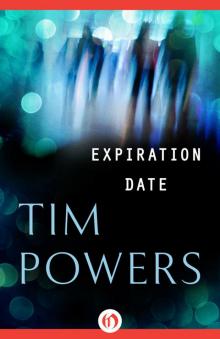 Expiration Date
Expiration Date On Stranger Tides
On Stranger Tides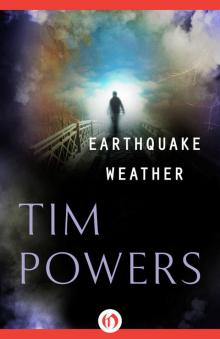 Earthquake Weather
Earthquake Weather Forsake the Sky
Forsake the Sky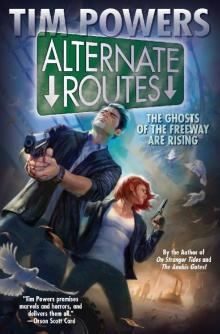 Alternate Routes
Alternate Routes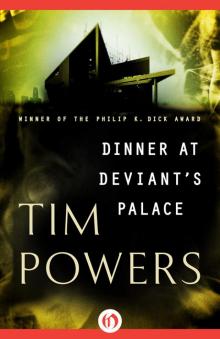 Dinner at Deviant's Palace
Dinner at Deviant's Palace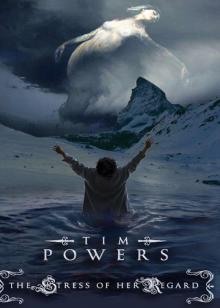 The Stress of Her Regard
The Stress of Her Regard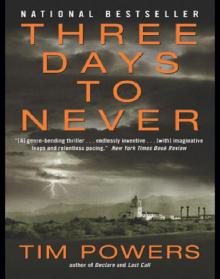 Three Days to Never: A Novel
Three Days to Never: A Novel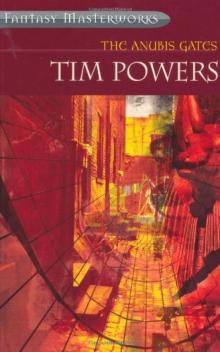 The Anubis Gates
The Anubis Gates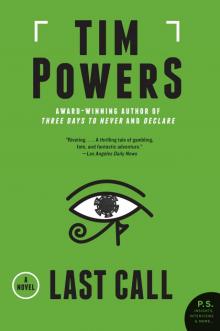 Last Call
Last Call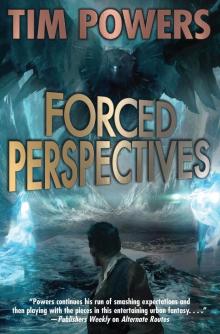 Forced Perspectives
Forced Perspectives Strange Itineraries
Strange Itineraries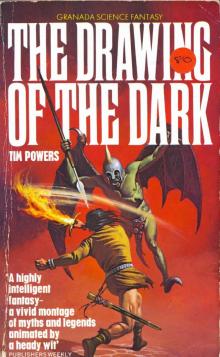 The Drawing of the Dark
The Drawing of the Dark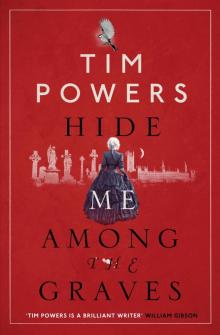 Hide Me Among the Graves
Hide Me Among the Graves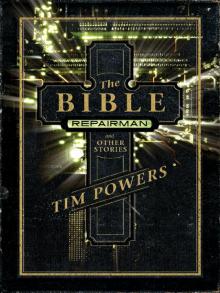 The Bible Repairman and Other Stories
The Bible Repairman and Other Stories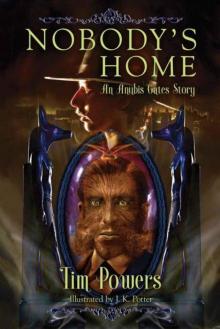 Nobody's Home: An Anubis Gates Story
Nobody's Home: An Anubis Gates Story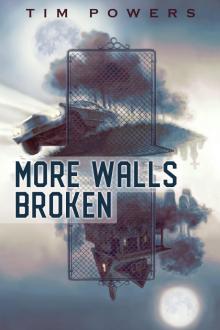 More Walls Broken
More Walls Broken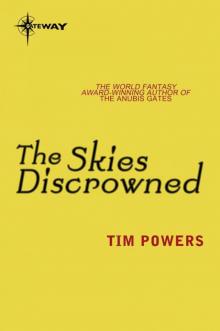 The Skies Discrowned
The Skies Discrowned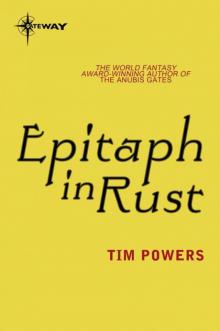 Epitaph in Rust
Epitaph in Rust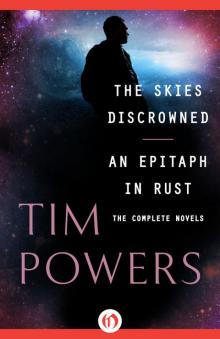 Skies Discrowned and An Epitaph in Rust
Skies Discrowned and An Epitaph in Rust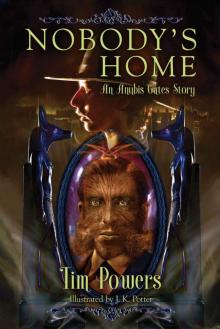 Nobody's Home
Nobody's Home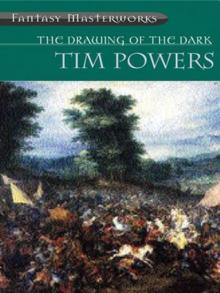 Drawing of the Dark
Drawing of the Dark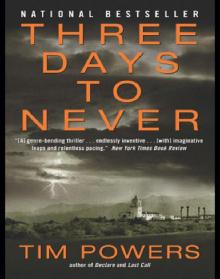 Three Days to Never
Three Days to Never